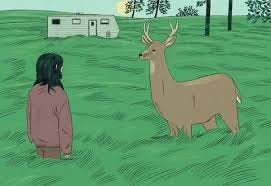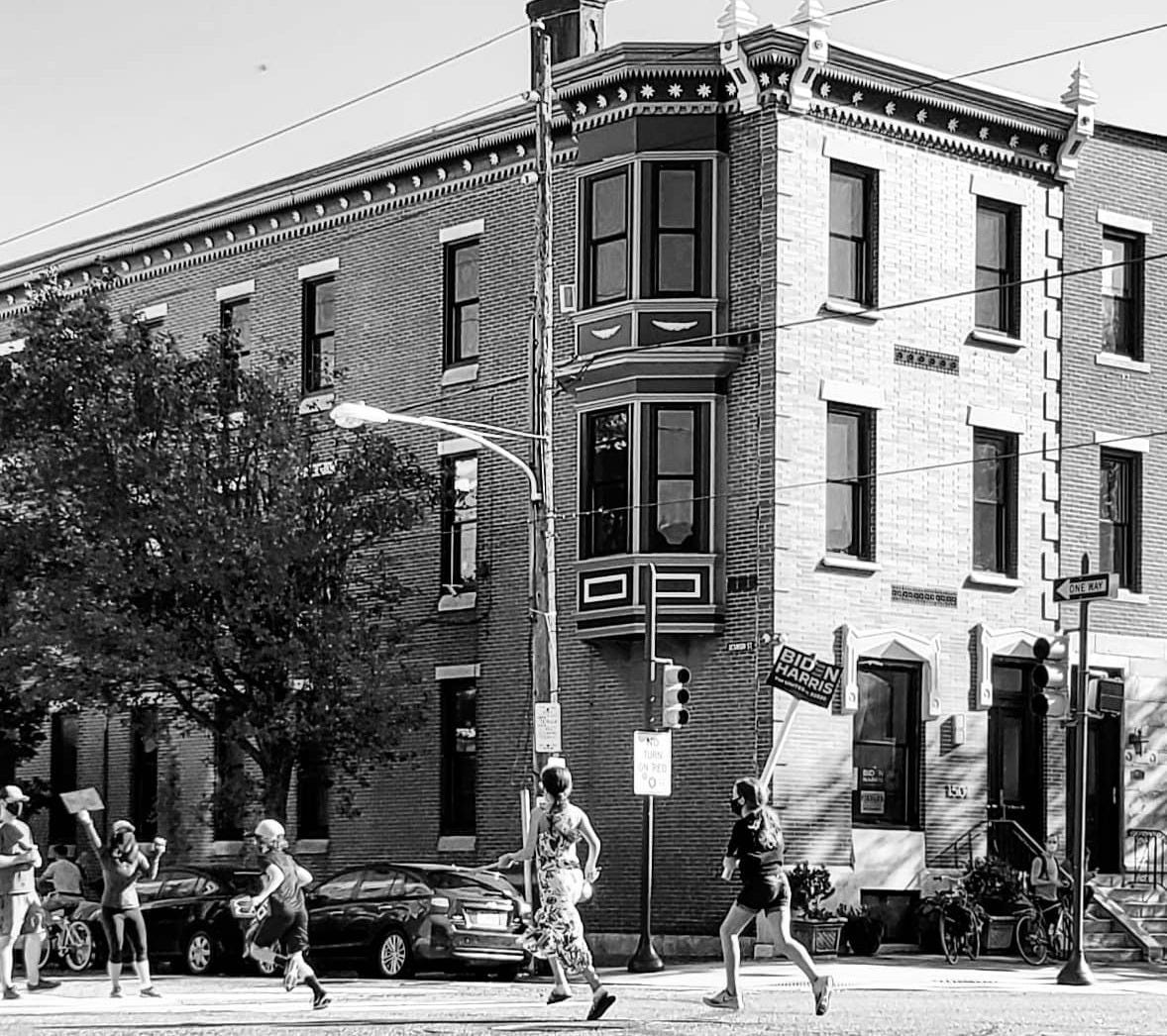The One Where I Talk About Voting
Content Warning: Thoughts about why eligible US citizens should vote
You Guys! Super Exciting News! Not sure if I pestered enough people, manifested hard enough, or was serendipitously called upon, but I just reviewed my first book for the Times. So glad it was Ann Clare LeZotte’s latest—the tender and important YA novel-in-verse, Deer Run Home. Deaf author, protagonist, and reviewer for the #DeafShelf trifecta! Pick up a copy if you get a chance.

Now I’m going to talk about voting. This isn’t to guilt or shame anybody, or to open myself up to (more!) Internet guilt or shame, but rather some thinking out loud with the hope that seeing some thoughts resonate. Which I guess is pretty much the same as all the other letters I’ve written here.
Except unlike all cute little craft talks, the idea of voting is sticky these days. Because the country is a mess, and the world is a literal hot mess, and participating in an election of two bad choices for Captain of Large Sinking Ship feels useless, or dirty, or like abetting the guys who crashed the boat in the first place.
I’ve seen a lot of those who plan to abstain from voting frame the choice as a way of taking the moral high ground, standing against the war in Gaza in particular, as well as a host of other grievances against the current administration, democratic party, or general systemic terrors. The cliche folks keep returning to is, “the lesser of two evils is still evil.”
And here’s the thing. Actually, I agree—about wanting the war to stop, the foul nature of intraparty politics, the general state of chaos. The evil. But not with the conclusion. Because while of course the lesser of two evils is still evil, the the lesser of two evils is also…less.

Obviously my stance is motivated in part by self-preservation: As a deaf person, I worry about a life for my son, myself, and all disabled people without the Americans with Disabilities Act, a protection which would be removed by the GOP plan for restructuring of the Department of Justice. I worry about the closure of the Department of Education (which Trump was promising on the talk shows just last week), without which disabled children have no legal right to education or accommodations. Of the closure of OSERS, which would mean the loss of NTID, Gallaudet, the printing house for the blind, and host of other services and programs for deaf and disabled folks. I worry about access to reproductive healthcare for myself and others. (And yeah, I worry about being able to write books that contain LGBTQ characters and/or whatever the Right deems “unsavory” next.)
But wait—I’ve got universal-sized worries, too! About the removal of what paltry climate protections we have in place. About the slaughter of those in Gaza, and Sudan, and Congo, and Ukraine, and our ability as citizens to communicate with/pressure/protest against the government regarding any of this—all of this—under the regime of a megalomaniac controlled only by his own impulse for grift, the authoritarians he admires (Putin and Bibi among them), and the white Christian nationalists at home.
That authoritarianism is already here for the marginalized is true, and still—sometimes incomprehensibly so—it can be worse.
As Americans, we all have blood on our hands, as we have for centuries, and neither voting nor not voting changes that. But I don’t believe that voting changes nothing. Nor do I believe that abstaining and allowing disabled kids to be denied education, and women and trans kids denied healthcare, and the military in the streets ruling with impunity against a civilian population, is either penance enough for the violence committed or bankrolled in our name, or a useful show of solidarity to those victims.
I voted uncommitted in the primary. I’ve voted Working Family tickets in states I’ve lived where those exist. And I do see the value of protest voting, or abstention, or choosing to vote only down-ballot in some situations. But for me, this isn’t one of them. Not only because we know one of two people is going to become President, and we know the Trump one is not going to help Palestinians, or anyone who is not himself. But also because at home, dismantling remaining federal protections for marginalized folks and allowing the GOP to use (more) military force at home erodes that local autonomy. Any choices we might make for ourselves in state or local elections will be leveled by the increased use of the military force against civilians, not to mention the further decimation of courts with Trump appointees and without the DOJ, etcetera.
Ultimately, I don’t think we can opt out even if we try. I also don’t necessarily see the act of voting as a validation of this f*cked system any more so than paying taxes, or waking up in the morning and doing capitalism by going to work or to the store, using an AI-addled search engine or social media site, or driving in a car, or eating meat, or using something made of plastic, or upgrading that iPhone—there’s actually a solid Good Place episode about the moral quandaries of being alive in a global economy—but anyway, any number of participatory actions in society. I don’t buy this idea that interacting with any human or group—including, but not limited to voting for them—is also an endorsement of all they have done or will ever do.
A writer I admire has described this election as having to choose to jump in and swim either through sewage-filled water, or through lava—both suck, but one gives us a chance of survival. I feel that. Another professor friend compared voting to a form of public transport—it’s often gonna let you down, and it’s not gonna drop you off at your house, but still you pick the bus/subway/trolley that’ll get you closer to where you need to be. And I feel that, too.
I don’t feel particularly excited about voting for Harris. (I’m going to, to be clear, but) I’m not riding any vibes. I feel mostly abject terror at the state of the world as it is, already. I understand those that argue that we’re beyond the point of reform, that collapse and regeneration from the ashes is the only way through now. They may very well be right, and if they are, we’ll reach that inevitable end regardless. But just in case—if my friend was bleeding, I’d put a tourniquet on them before I threw up my hands and declared them good as dead. I hope someone would do the same for me.
No one is coming to save us, and, having seen the effects of modern day civil war up close, I do think we have better chance of saving ourselves—and of fighting on behalf of others—without the full scale implosion. People already experience violence, hunger, and all manner of horrors at the hands of the state currently, but subjecting them to more intense versions of those circumstances in order to ameliorate those circumstances just doesn’t add up.
So if I can do a quick and free action that saves the life of even one, 10, 100 people, I’ll choose those lives over my personal bragging rights to moral purity every time. Because voting isn’t enough. Honestly, voting is barely a start. Voting doesn’t mean we can’t fight for what we know to be true through other means—in fact, we must. But just in case, I’m also going to vote. Because the lesser of two evils is still less.



